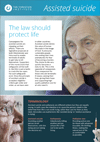New guidelines for applying the law against assisted suicide are “not fit for purpose” and place vulnerable people at risk, according to a group of leading lawyers, Peers and former judges.
The group says that preliminary guidance issued by the Director of Public Prosecutions (DPP) is badly flawed and risks being misinterpreted to mean that cases of assisting suicide will not be prosecuted “if certain prescribed boxes are ticked”.
The DPP for England and Wales, Keir Starmer QC, published the guidelines in September and opened them to public consultation.
He had been ordered by the Law Lords to explain the circumstances under which he is likely to prosecute cases of assisted suicide.
Writing in The Daily Telegraph on Saturday, Lord Carlile of Berriew said the draft guidelines need “radical reappraisal”.
Lord Carlile, who is the Government’s adviser on terrorism legislation, asked whether citizens should be told how to avoid being prosecuted for actions which are clearly illegal.
Answering his own question, Lord Carlile said that if the criminal law is to be upheld, prosecutors assessing cases of assisted suicide should start “from a presumption in favour of prosecution to which exceptions may be allowable in special circumstances”.
He said the new guidelines move away from this established rule.
He also described some of the DPP’s proposed “factors” against prosecuting assisted suicides as “very worrying” and “unacceptable” in a civilised society.
These were factors which discriminated against the sick, the disabled and the suicidal. According to Lord Carlile the guidelines afford these people less protection and “fly in the face of the principle that the law must afford equal protection to all, irrespective of age, gender, race, religion – and state of health”.
Lord Carlile also questioned the assumption within the guidelines that “family members invariably have the deceased’s interests at heart”.
On the contrary, he warned that this assumption is dangerous because “the plain fact is that most violence and abuse takes place within families”.
Although Lord Carlile acknowledged the difficulty of the DPP’s task, he warned that the guidance “accepts many of the false assumptions of the euthanasia lobby”.
He said it was therefore no surprise that pro-euthanasia campaigners had welcomed the guidelines as “a significant breakthrough” and “a stepping stone to a euthanasia law”.
Other members of the group echo Lord Carlile’s concerns in a letter to The Times today.
The letter repeats Lord Carlile’s concerns about discrimination against the seriously ill and disabled and the “dangerously unrealistic” assumption that close family members are invariably “loved ones”.
It also says that the DPP’s guidelines risk being “misinterpreted as implying that breaches of the law will not be prosecuted if certain prescribed boxes are ticked”.
The letter is signed by former Lord Chancellor Lord Mackay of Clashfern, distinguished medic Lord Walton of Detchant, Former President of the Royal College of Psychiatrists Professor Sheila Hollins and disability campaigner Baroness Campbell of Surbiton, together with Lord Carlile.
Last week leading doctors voiced fears that fellow practitioners could help someone kill themselves but avoid prosecution under the DPP’s proposed guidance.
The British Medical Association (BMA) asked the DPP for “further clarification” about the role of doctors under the guidelines.
The BMA are particularly concerned about one factor which suggests a prosecution would be less likely if someone helped a victim kill themselves “as a consequence of his or her usual lawful employment”.
The public interest factors in favour of prosecution identified in the interim policy include that:
• The victim was under 18 years of age;
• The victim’s capacity to reach an informed decision was adversely affected by a recognised mental illness or learning difficulty;
• The victim did not have a clear, settled and informed wish to commit suicide; for example, the victim’s history suggests that his or her wish to commit suicide was temporary or subject to change;
• The victim did not indicate unequivocally to the suspect that he or she wished to commit suicide;
• The victim did not ask personally on his or her own initiative for the assistance of the suspect;
• The victim did not have a terminal illness; or a severe and incurable physical disability; or a severe degenerative physical condition from which there was no possibility of recovery;
• The suspect was not wholly motivated by compassion; for example, the suspect was motivated by the prospect that they or a person closely connected to them stood to gain in some way from the death of the victim;
• The suspect persuaded, pressured or maliciously encouraged the victim to commit suicide, or exercised improper influence in the victim’s decision to do so; and did not take reasonable steps to ensure that any other person did not do so.
The public interest factors against a prosecution include that:
• The victim had a clear, settled and informed wish to commit suicide;
• The victim indicated unequivocally to the suspect that he or she wished to commit suicide;
• The victim asked personally on his or her own initiative for the assistance of the suspect;
• The victim had a terminal illness or a severe and incurable physical disability or a severe degenerative physical condition from which there was no possibility of recovery;
• The suspect was wholly motivated by compassion;
• The suspect was the spouse, partner or a close relative or a close personal friend of the victim, within the context of a long-term and supportive relationship;
• The actions of the suspect, although sufficient to come within the definition of the offence, were of only minor assistance or influence, or the assistance which the suspect provided was as a consequence of their usual lawful employment.

